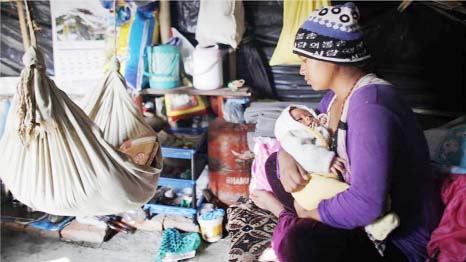
Al Jazeera, Kathmandu :
Aid efforts remain slow as local villagers brace for freezing conditions nine months after devastating earthquake.
It has been nine months since a magnitude 7.8 earthquake hit Nepal, killing at least 8,000 people and displacing hundreds of thousands of families.
Now Nepal’s government is facing a new challenge – preparing disaster survivors for winter’s cold weather.
The government has started distributing $100 to families to buy warm clothes, but local villagers say the amount is only enough to meet their short-term food needs. In Sindhupalchowk district, one of the worst-hit areas in the earthquake, six people have died so far this winter.
According to Gokarna Mani Duwad, Sindhupalchowk district’s chief officer, the reconstruction of houses has also been going slow. “The earthquake was in April. The reconstruction authority has only been established now,” Duwad said. Al Jazeera’s Subina Shrestha reports from Jamune village in Sindhupalchowk district.
Meanwhile, Crippling shortages of daily commodities and life-saving medicines have left millions of children at risk of death and disease as the harsh winter looms in the Himalayan country, according to UNICEF, the UN agency for children. Nepal’s government says an economic blockade by India has led to severe shortages in the landlocked country, forcing it to ration petroleum products and cooking gas. India has lent support to the Madhesis of Nepal’s southern plains, who are upset over the provisions of the new constitution promulgated three months ago. India, which denies it has imposed a blockade, says the cargo trucks are stranded on the border owing to unrest in the region.
UNICEF, in a statement on Monday, sounded the alarm on the impending emergency, but Nepali authorities seem woefully unprepared to tackle the crisis.
“It’s a serious problem, our children are at risk. The blockade has created uneasy circumstances and everyone has been impacted by it,” Narayan Prasad Kafle, a spokesperson for the women, children and social welfare ministry, told Al Jazeera. “We don’t have any specific programmes to deal with this. We also don’t have budget to do so. We have urged the NGOs [nongovernmental organisations] to support them.”
The UNICEF statement paints a grim picture of the unfolding crisis, stating that children recovering from the two earthquakes that struck Nepal earlier this year could be the worst hit.
“More than 200,000 families affected by the tremors are still living in temporary shelters, at an altitude above 1,500 metres where weather conditions will be harshest this winter,” UNICEF said in its statement.
Aid efforts remain slow as local villagers brace for freezing conditions nine months after devastating earthquake.
It has been nine months since a magnitude 7.8 earthquake hit Nepal, killing at least 8,000 people and displacing hundreds of thousands of families.
Now Nepal’s government is facing a new challenge – preparing disaster survivors for winter’s cold weather.
The government has started distributing $100 to families to buy warm clothes, but local villagers say the amount is only enough to meet their short-term food needs. In Sindhupalchowk district, one of the worst-hit areas in the earthquake, six people have died so far this winter.
According to Gokarna Mani Duwad, Sindhupalchowk district’s chief officer, the reconstruction of houses has also been going slow. “The earthquake was in April. The reconstruction authority has only been established now,” Duwad said. Al Jazeera’s Subina Shrestha reports from Jamune village in Sindhupalchowk district.
Meanwhile, Crippling shortages of daily commodities and life-saving medicines have left millions of children at risk of death and disease as the harsh winter looms in the Himalayan country, according to UNICEF, the UN agency for children. Nepal’s government says an economic blockade by India has led to severe shortages in the landlocked country, forcing it to ration petroleum products and cooking gas. India has lent support to the Madhesis of Nepal’s southern plains, who are upset over the provisions of the new constitution promulgated three months ago. India, which denies it has imposed a blockade, says the cargo trucks are stranded on the border owing to unrest in the region.
UNICEF, in a statement on Monday, sounded the alarm on the impending emergency, but Nepali authorities seem woefully unprepared to tackle the crisis.
“It’s a serious problem, our children are at risk. The blockade has created uneasy circumstances and everyone has been impacted by it,” Narayan Prasad Kafle, a spokesperson for the women, children and social welfare ministry, told Al Jazeera. “We don’t have any specific programmes to deal with this. We also don’t have budget to do so. We have urged the NGOs [nongovernmental organisations] to support them.”
The UNICEF statement paints a grim picture of the unfolding crisis, stating that children recovering from the two earthquakes that struck Nepal earlier this year could be the worst hit.
“More than 200,000 families affected by the tremors are still living in temporary shelters, at an altitude above 1,500 metres where weather conditions will be harshest this winter,” UNICEF said in its statement.

